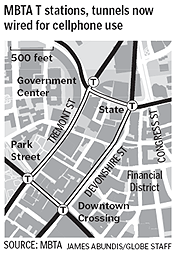Washington Ferries: Connected at Last!
Posted by samc on December 27th, 2007The long-awaited WiFi service on the Bremerton-Seattle ferry route, became available this week, reports the Kitsap Sun. It allows riders to surf the Web, and check e-mail during the hour-long crossing. Additional ferry customers could be added on Monday if testing goes well.
The service, which went live on Christmas Eve without any fanfare, brings Wi-Fi to all of Washington State Ferries’ most-traveled routes. Kingston-Edmonds and Bainbridge-Seattle got access in November 2006, but the Bremerton route was stalled by unique technical challenges.
According to the implementation plan, which can be seen at wsf-wifi.com, wireless will be coming the first quarter of next year to the remaining routes — the Vashon-Seattle passenger ferry, Anacortes-San Juan Islands and Port Townsend-Keystone — whenever auto ferry service returns to that route. It is being installed for Washington State Ferries by Parsons, a company based in Sacramento, Calif.
The service isn’t free, but riders can get two hours per day for seven days by taking a survey about what they expect in Wi-Fi service. Those who are interested can go www.wsf-wifi.com/surveyentry.
 The regular cost is $29.95 per month, $6.95 a day or $2.95 for 15 minutes plus 25 cents per minute thereafter. If a user already subscribes to iPass or Boingo, the ferry wireless service providers, there is no charge other than roaming fees. There’s a special introductory offer through March for $14.95 for the first month. The ferry system keeps 20 percent of the revenue.
The regular cost is $29.95 per month, $6.95 a day or $2.95 for 15 minutes plus 25 cents per minute thereafter. If a user already subscribes to iPass or Boingo, the ferry wireless service providers, there is no charge other than roaming fees. There’s a special introductory offer through March for $14.95 for the first month. The ferry system keeps 20 percent of the revenue.
One of the biggest hurdles was finding a place to put an antenna within sight of Rich Passage, the narrow channel between Bainbridge Island and South Kitsap through which the ferry sails. Parsons had wanted to install it along the shores of Bainbridge Island, but the city prohibits wireless towers within 200 feet of the waterfront.
The Bremerton-Seattle route, at about 60 minutes, is the longest commuter route in Puget Sound, and it lends itself to Wi-Fi because there’s more time to use it. Subscribers would get more value for their $30 monthly fee than the riders of other commuter routes, which average about 20 or 30 minutes, says the paper.
 In related transit wireless news, Boston subway riders are now getting mobile phone & data service underground, reports the Boston Globe. InSite Wireless was supposed to have the first four stations wired two years ago, but negotiations with incumbent carriers delayed the process.
In related transit wireless news, Boston subway riders are now getting mobile phone & data service underground, reports the Boston Globe. InSite Wireless was supposed to have the first four stations wired two years ago, but negotiations with incumbent carriers delayed the process.
T-Mobile and Verizon both connected their networks earlier this month, with AT&T becoming the third cellphone provider to offer a signal underground this week. Each weekday, some 312,000 riders travel through the core of the subway system, says the Massachusetts Bay Transportation Authority
MBTA General Manager Daniel A. Grabauskas believes most riders will embrace cellphone service as a convenience for getting work done and keeping appointments, as well as a way to report suspicious behavior. He also hopes to give commuters another reason to ditch their cars. “People can let somebody else do some driving while you’re able to do some work,” he said.
 New York City’s Transportation Authority recently approved Transit Wireless to spend up to $200 million to equip the 277 underground New York City subway stations for cell phone and wireless Internet service. They’ll sub-contract with Dianet Communications, a company specializing in Distributed Antenna Systems for buildings and underground facilities.
New York City’s Transportation Authority recently approved Transit Wireless to spend up to $200 million to equip the 277 underground New York City subway stations for cell phone and wireless Internet service. They’ll sub-contract with Dianet Communications, a company specializing in Distributed Antenna Systems for buildings and underground facilities.
source : dailywireless.org


No comments:
Post a Comment